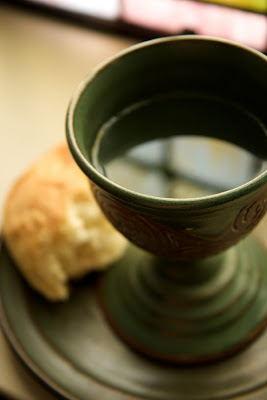“Father, if you are willing, take this cup from me; yet not my will, but yours be done.” Luke 22:42
I offer my cup, hold it out, offer it up for others to take and sip. But it remains mine to drink. And why should I expect anything different?
Jesus begged the same question that night in Gethsemane, "Take this cup."
Facing cross-shaped pain and death, Jesus offered up his cup. If obedience came in any other form, if any other payment could be offered, Jesus wanted a trade. But the cup remained his to drink.
My lips rest on cup's rim before I tip. The strong aroma of blood-red wine overwhelms me and I hesitate, asking one more time, "May I trade this cup for a sweeter white?" And when my cup remains, no trades allowed, I have a choice: refuse the blood-red cup and walk away or accept it and drink.
Before Jesus tipped his cup he surrendered all - his will for the Father's perfect redemptive plan. And when I first read this, I think of course he did, he was God's son. But the white spaces between the cup and his obedience reveal his torment.
"An angel from heaven appeared to him and strengthened him. And being in anguish, he prayed more earnestly, and his sweat was like drops of blood falling to the ground."
Luke 22:43-44
He didn't want to drink this blood-red wine. Dismayed, Jesus begged and pleaded for a sweeter white until his humanity perspired, weakened and slumped. Could Jesus, fully-God, fully-man not see resurrection joy ahead? I don't know.
"The discipline of dismay," says Oswald Chambers, "is an essential lesson which a disciple must learn. The danger is that we tend to look back on our times of obedience and on our past sacrifices to God in an effort to keep our enthusiasm for Him strong. But when the darkness of dismay comes, endure it until it is over, because out of it will come the ability to follow Jesus truly, which brings inexpressibly wonderful joy" (My Utmost for His Highest, Discovery House, 1992).
Knowing the hour, God sent Jesus his strength-ministering angel so that He might endure the drink until the full cup of blood-red wine emptied at Calvary. And Calvary held no joy. No, for that was the saddest day when Jesus fully surrendered his will, endured the cross and took on sin. That death-consuming day the earth grew dark and shook at the weight of all He bore.
Joy came after the dying.
And still does.
Lips pressed against my communion cup, I drink. I do so in remembrance of Jesus' obedient sacrifice - his laying down and dying - for me, for us all. And I empty myself right there, in the memory of the cross, knowing that whatever transformation takes place after the laying down, I'm assured joy follows. For part of remembrance is the empty tomb - the joy of transformed resurrected life.

No comments:
Post a Comment